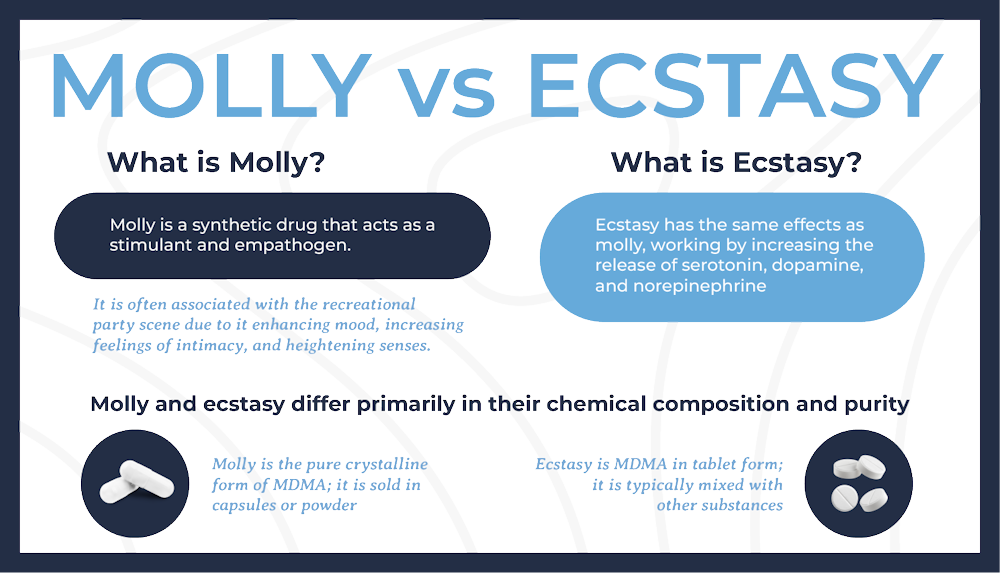Molly and ecstasy are two recreational drugs commonly found in the party scene. Both drugs produce similar effects but differ significantly in their composition and side effects. In this article, we will explore the dangers, risks, and treatment options for molly and ecstasy.
If you or a loved one is struggling with substance use, our addiction treatment programs in Portland can help. We can provide you with the means necessary to overcome addiction.
What is the Difference Between Molly and Ecstasy?
 Molly and ecstasy, while related in terms of their chemical composition, have distinct differences. Molly is the crystalline powder form of MDMA, which is a synthetically produced psychoactive drug with stimulant and hallucinogenic properties. It typically comes in capsule form.
Molly and ecstasy, while related in terms of their chemical composition, have distinct differences. Molly is the crystalline powder form of MDMA, which is a synthetically produced psychoactive drug with stimulant and hallucinogenic properties. It typically comes in capsule form.
Ecstasy, on the other hand, is typically found as tablets or capsules that contain a combination of MDMA and other substances such as caffeine or ephedrine. In terms of purity, molly is generally considered to be purer than ecstasy as it does not include any additional substances. However, either drug can be adulterated with other drugs or contaminants.
Is Molly the Same as Ecstasy?
Molly and ecstasy are not interchangeable. Molly is the street term for MDMA, a pure form of ecstasy, which is a synthetic drug that acts as a stimulant and hallucinogen. While molly is typically seen as the pure form of MDMA, ecstasy pills may contain other addictive drugs such as cocaine, methamphetamine, bath salts, or caffeine.
Molly is not always synonymous with ecstasy because it typically contains only MDMA whereas ecstasy has a higher potential to contain other drugs or substances.
How Are Molly and Ecstasy Different From MDMA?
Molly and ecstasy are both forms of MDMA. However, molly is a form of pure MDMA, while ecstasy is MDMA combined with other ingredients such as caffeine, dextromethorphan, ephedrine, ketamine, or methamphetamine. The additional ingredients in ecstasy can lead to more extreme and unpredictable effects than those experienced from pure MDMA in molly.
MDMA Addiction and Withdrawal
MDMA addiction is a type of substance use disorder that can develop from the repeated use of ecstasy or molly. MDMA is a psychoactive drug that produces feelings of increased energy, pleasure, emotional warmth, and distorted sensory and time perception. With long-term use, people can become dependent on the drug and experience withdrawal symptoms when not using it.
The most common MDMA withdrawal symptoms include insomnia or disturbed sleep patterns, loss of appetite or overeating, heightened anxiety or paranoia, restlessness or agitation, and cravings for the drug. These withdrawal symptoms may appear shortly after someone stops taking MDMA and can last up to a few weeks. Long-term users may experience more severe withdrawal symptoms including suicidal thoughts or behaviors.
In addition to physical withdrawal symptoms, people struggling with MDMA addiction may experience psychological effects including depression and intense cravings for the drug. As with any other substance use disorder, treatment should be tailored to each individual’s needs.
How Does Molly Affect the Body Compared to Ecstasy?

Molly acts as both a stimulant and psychedelic, producing an energizing effect, distortions in time and perception, and enhanced enjoyment from tactile experiences. Ecstasy has similar effects but may include dangerous adulterants that can cause serious side effects such as difficulty regulating body temperature or increased heart rate and blood pressure. Compared to ecstasy, molly’s effects on the body are typically less severe because it doesn’t include adulterants.
Physical Health Risks
The physical health risks of taking molly and ecstasy can be serious. The drugs both act as stimulants, which can lead to symptoms such as:
- Dizziness
- Dehydration
- Overheating
- Kidney failure
- Increased heart rate
- Increased blood pressure
- Muscle tension
- Blurred vision
Mental Health Risks
Molly and ecstasy are drugs that alter the brain chemistry to create feelings of euphoria, heightened sensations, increased energy, and empathy. However, taking these drugs can also have serious mental health risks including:
- Anxiety
- Irritability
- Insomnia
- Paranoia
- Psychosis
- Depression
- Aggression
- Mood swings
- Panic attacks
- Addiction and dependence
These drugs can also lead to impaired judgment, which can result in risky behavior such as unprotected sex or dangerous driving. Long-term use of molly and ecstasy can also lead to permanent damage to the brain and other organs.
Molly vs Ecstasy: Which is More Dangerous?
Molly and ecstasy are both potentially dangerous substances with similar effects. Both can cause a range of physical and psychological side effects, including seizures, anxiety, and even death in extreme cases.
Additionally, molly and ecstasy can be laced with other drugs such as amphetamines or stimulants that can increase their potency and potential danger. It is crucial to be aware of these dangers if you are ever offered these toxic drugs.
Short-Term Effects of Molly and Ecstasy
The short-term effects of taking molly and ecstasy can vary depending on a person’s physical and emotional health, as well as the amount taken. Generally speaking, these effects can include increased energy and alertness, heightened feelings of pleasure, reduction in inhibitions, and an altered sense of time. Additionally, people may experience elevated heart rate and blood pressure levels, blurred vision, or nausea.
Long-Term Effects of Molly and Ecstasy
The long-term effects of taking MDMA (ecstasy/molly) vary depending on the amount taken and how often it is taken. Some potential long-term effects include permanent changes in brain chemistry, increased anxiety levels, memory problems, sleep disturbances, impaired learning and concentration, and increased risk of stroke or heart attack. Additionally, long-term use may lead to tolerance and physical dependence that requires addiction treatment.
Molly vs Ecstasy: Treatment Options

Residential Treatment
Residential treatment for MDMA addiction is a form of intensive treatment that provides 24-hour care and supervision. It’s designed to help individuals struggling with MDMA addiction recover from their addiction in a safe and secure environment.
While in our inpatient rehab in Oregon, individuals receive psychological and medical support to address the issues underlying their addiction as well as develop healthy coping mechanisms. This type of treatment typically includes individual and group therapy, relapse prevention education, nutrition counseling, vocational training, and recreational activities.
Intensive Outpatient Program (IOP)
An intensive outpatient program (IOP) for MDMA addiction is designed to provide specialized care and support to those dealing with addiction. The program is typically structured around individual therapy sessions, group counseling, and other activities that focus on helping the person understand their addiction and learn strategies for overcoming it. Our intensive outpatient program in Portland, Oregon can help those who are trying to recover from MDMA addiction
Outpatient Program (OP)
An outpatient program (OP) for MDMA addiction typically consists of a range of therapeutic services that are designed to help individuals identify the underlying causes of their addiction and learn how to develop healthier coping skills. This type of program often includes individual or group therapy sessions where individuals can discuss any underlying issues related to their addiction, as well as receive guidance and support from trained professionals.
Dual Diagnosis Treatment
Dual diagnosis treatment facilities for MDMA addiction offer specialized addiction treatment that addresses both the substance use disorder and any co-occurring mental health issues. The primary focus of dual diagnosis treatment is to:
- Identify the root cause of an individual’s substance use
- Address and treat any underlying mental health conditions
- Develop healthy coping strategies to reduce the risk of relapse
Treatment typically involves a combination of therapy, medications, lifestyle changes, and support groups.
Psychotherapy
Psychotherapy for MDMA addiction is an evidence-based treatment approach that focuses on helping people understand and manage the underlying psychological issues that may be contributing to their drug use. Here at Crestview Recovery, our addiction therapy services include cognitive behavioral therapy (CBT), dialectical behavior therapy (DBT), family therapy, individual therapy, and group therapy
The focus of the therapy is to help the individual identify and address any underlying emotional issues that may have contributed to their substance use. This includes understanding the reasons behind their drug use, building coping skills for managing stress and cravings, and developing healthier lifestyle habits. Psychotherapy can also help people build relationships with supportive family members and friends who can help them in recovery.
Sober Living Program
A sober living program for MDMA addiction is a form of treatment designed to provide a stable and supportive living environment for individuals working on recovery from MDMA addiction. The program typically requires that individuals abstain from drugs and alcohol, maintain consistent work or school attendance, and participate in regular counseling and therapy sessions. Here at our sober living Portland, Oregon facility, the focus of this program is to support an individual’s journey to sobriety by providing structure, accountability, and dialog about their choices in life.
Receive Addiction Treatment at Crestview Recovery
At Crestview Recovery, we provide a comprehensive approach to treating molly and ecstasy addiction. We offer evidence-based therapies such as cognitive behavioral therapy (CBT) as well as individual and group psychotherapy sessions. Our team of experienced therapists will help you learn how to manage your cravings and cope with triggers.
With our highly trained staff of doctors and nurses on board, we can ensure that you get the highest quality care possible while in treatment at Crestview Recovery. Contact us today if you or a loved one could benefit from our services!
































